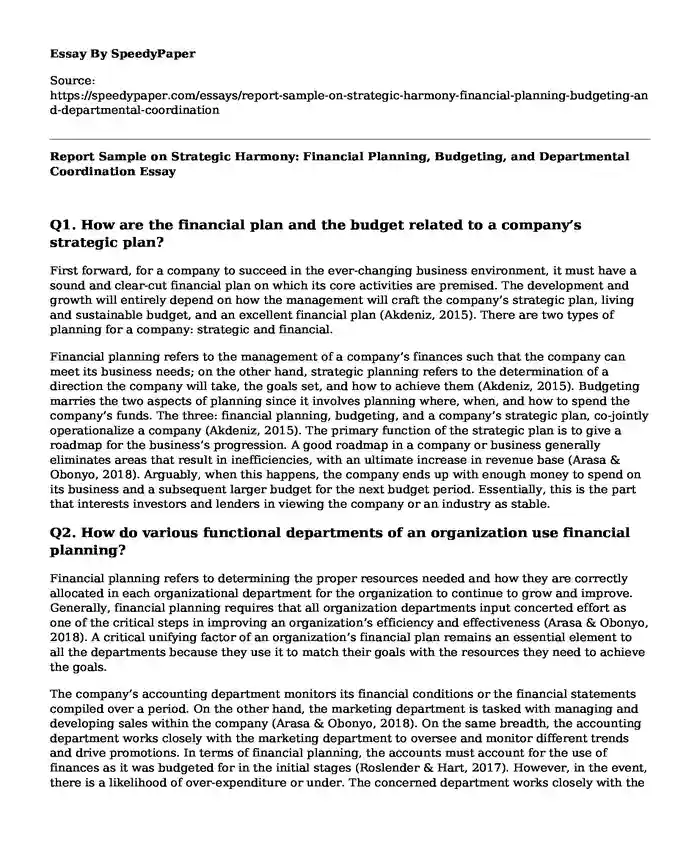Q1. How are the financial plan and the budget related to a company’s strategic plan?
First forward, for a company to succeed in the ever-changing business environment, it must have a sound and clear-cut financial plan on which its core activities are premised. The development and growth will entirely depend on how the management will craft the company’s strategic plan, living and sustainable budget, and an excellent financial plan (Akdeniz, 2015). There are two types of planning for a company: strategic and financial.
Financial planning refers to the management of a company’s finances such that the company can meet its business needs; on the other hand, strategic planning refers to the determination of a direction the company will take, the goals set, and how to achieve them (Akdeniz, 2015). Budgeting marries the two aspects of planning since it involves planning where, when, and how to spend the company’s funds. The three: financial planning, budgeting, and a company’s strategic plan, co-jointly operationalize a company (Akdeniz, 2015). The primary function of the strategic plan is to give a roadmap for the business’s progression. A good roadmap in a company or business generally eliminates areas that result in inefficiencies, with an ultimate increase in revenue base (Arasa & Obonyo, 2018). Arguably, when this happens, the company ends up with enough money to spend on its business and a subsequent larger budget for the next budget period. Essentially, this is the part that interests investors and lenders in viewing the company or an industry as stable.
Q2. How do various functional departments of an organization use financial planning?
Financial planning refers to determining the proper resources needed and how they are correctly allocated in each organizational department for the organization to continue to grow and improve. Generally, financial planning requires that all organization departments input concerted effort as one of the critical steps in improving an organization’s efficiency and effectiveness (Arasa & Obonyo, 2018). A critical unifying factor of an organization’s financial plan remains an essential element to all the departments because they use it to match their goals with the resources they need to achieve the goals.
The company’s accounting department monitors its financial conditions or the financial statements compiled over a period. On the other hand, the marketing department is tasked with managing and developing sales within the company (Arasa & Obonyo, 2018). On the same breadth, the accounting department works closely with the marketing department to oversee and monitor different trends and drive promotions. In terms of financial planning, the accounts must account for the use of finances as it was budgeted for in the initial stages (Roslender & Hart, 2017). However, in the event, there is a likelihood of over-expenditure or under. The concerned department works closely with the financial department for reconciliation and possible means to save the company from any losses.
The accounting department, with all its financial statements, is critical to the success of a company. Typically, all business keeps accounting systems to monitor the financial implications of specific businesses. Therefore, the accounting department is responsible for preparing and analyzing the financial statements concerning financial planning laid down at the onset of the company’s operationalization (Roslender & Hart, 2017). In the end, the entire department must seamlessly work together but with consideration of the company’s financial planning to realize success.
Financial expenditure is a common factor across all the departments that unites and can cause disharmony within an organization. In management, setting how the organization’s finances are spent is one key element that indicates a clear path to success (Roslender & Hart, 2017). All the departments, therefore, are answerable to each other as far as financial planning is concerned.
References
Akdeniz, C. (2015). Key Questions in Strategic Planning. Can Akdeniz. https://es.scribd.com/audiobook/398742648/Key-Questions-in-Strategic-Planning
Arasa, R., & Obonyo, P. K. (2018). The relationship between strategic planning and firm performance. www.semanticscholar.org/paper/The-Relationship-between-Strategic-Planning-and-Arasa-Obonyo/b1c191205fc8b4b530ef51fc1a7a8e74c6d14bad
Roslender, R., & Hart, S. J. (2017). Integrating management accounting and marketing in the pursuit of competitive advantage: the case for strategic management accounting. Critical Perspectives on Accounting, 13(2), 255-277. https://smallbusiness.chron.com/relationship-between-accounting-marketing-22788.html
Cite this page
Report Sample on Strategic Harmony: Financial Planning, Budgeting, and Departmental Coordination. (2024, Jan 04). Retrieved from https://speedypaper.com/essays/report-sample-on-strategic-harmony-financial-planning-budgeting-and-departmental-coordination
Request Removal
If you are the original author of this essay and no longer wish to have it published on the SpeedyPaper website, please click below to request its removal:
- Essay Sample about the Difference Between the Islamic Conventional Banking Systems
- Marketing Essay Example: Differentiation Strategy in Competitive Advantage
- Essay Sample on Product Offering
- Essay Sample on Entry Into a New Market
- Essay Sample on Models for Organizational Change
- Ibn Khuldoon National School - Bahrain. Paper Example
- Free Essay Example - Future State Analysis
Popular categories





